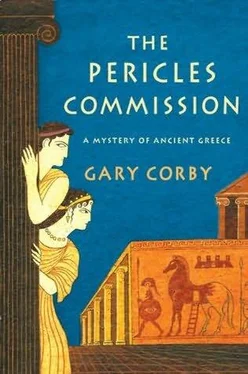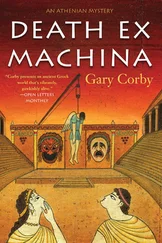Gary Corby - The Pericles Commission
Здесь есть возможность читать онлайн «Gary Corby - The Pericles Commission» весь текст электронной книги совершенно бесплатно (целиком полную версию без сокращений). В некоторых случаях можно слушать аудио, скачать через торрент в формате fb2 и присутствует краткое содержание. Жанр: Исторический детектив, на английском языке. Описание произведения, (предисловие) а так же отзывы посетителей доступны на портале библиотеки ЛибКат.
- Название:The Pericles Commission
- Автор:
- Жанр:
- Год:неизвестен
- ISBN:нет данных
- Рейтинг книги:5 / 5. Голосов: 1
-
Избранное:Добавить в избранное
- Отзывы:
-
Ваша оценка:
- 100
- 1
- 2
- 3
- 4
- 5
The Pericles Commission: краткое содержание, описание и аннотация
Предлагаем к чтению аннотацию, описание, краткое содержание или предисловие (зависит от того, что написал сам автор книги «The Pericles Commission»). Если вы не нашли необходимую информацию о книге — напишите в комментариях, мы постараемся отыскать её.
The Pericles Commission — читать онлайн бесплатно полную книгу (весь текст) целиком
Ниже представлен текст книги, разбитый по страницам. Система сохранения места последней прочитанной страницы, позволяет с удобством читать онлайн бесплатно книгу «The Pericles Commission», без необходимости каждый раз заново искать на чём Вы остановились. Поставьте закладку, и сможете в любой момент перейти на страницу, на которой закончили чтение.
Интервал:
Закладка:
I had walked up the Panathenaic Way from the Agora to the Acropolis many times in my life, but not once had I stepped onto the Areopagus. I looked about with interest. The council met upon rock that had been chiseled to create a flat base, and about it stone had been cut away and smoothed to form seats. Elsewhere the Rock of the Areopagus was as rough as any outcrop. There were a few bushes, several thick enough to hide a man. I walked over to the spot where Ephialtes must have been standing. It commanded a fine view of the Agora to the north, where I could see tiny figures going about their business, setting up their stalls for the day, placing their wares, all of them unaware that their world had just changed. The wide, paved Panathenaic Way snaked southwards and upwards from the Agora to where the body of Ephialtes lay. I couldn’t see anyone walking up the road, but with morning well advanced on such a fine day, that wouldn’t last. To my right the Acropolis loomed high above me, a great solid fortress of almost unclimbable stone. A saddle of land separated the Areopagus from the Acropolis. I looked down into the valley to see Ephialtes’ body below. Yes, this was the spot. The force of the blow must have pushed him over the edge; I could see a splash of blood on an outcrop where he bounced off the rock face on the way down, pushing him still farther away. I turned around and scanned the rest of the Rock. It was clear to me that whoever had fired the arrow had either hidden among the seating of the council, or popped out from behind a bush, or perhaps was someone Ephialtes knew and did not fear.
There was no one there but a couple of slaves, old men tidying the place. It was early morning, when the Councilors would be about their own business.
“You two there!” Pericles barked. The slaves dropped their brooms and came to him. “What happened here?”
They looked blank. “We’re cleaning, sir,” one said.
“A man has just been murdered on this rock. Tell me what you saw.”
The slaves quaked.
This was no way to handle it. It is the law that slaves must be tortured when they testify in court; the greater the crime, the greater the pain.
“We saw nothing, sir,” the first said.
“And we didn’t hear nothing either,” the second added for good measure. They would have been fools to say anything else.
I said smoothly, “I’m sure these men aren’t witnesses, Pericles. They would have raised the alarm if they’d seen anything, wouldn’t you, men?”
Both nodded vigorously.
“But perhaps you can tell us, does anyone come here in the mornings?”
“Sometimes there’ll be a Councilor, sir, and someone will come to talk to him, official-like.”
“What happens then?”
“Don’t know, sir! We disappear until it’s over. Orders.”
“And this morning?”
“Don’t know, sir! We only just returned.”
“Returned?”
“Yes, sir! The Councilor ordered us to clear off.”
“Who! Who was it?” Pericles demanded.
The man shrank back, looking at Pericles in fear.
“But, sir, isn’t that why you’re here? Didn’t you say he died this morning?”
“What are you talking about?” Pericles asked.
The slave looked perplexed. “Why, sir, your father, Xanthippus,” he said. “That’s why we didn’t see anything. He ordered us away.”
I found myself at the home of Pericles, in his private office, where for half the morning he had paced to and fro, tearing out his hair. The performance had given me ample opportunity to study the man. I was struck by how almost perfectly proportioned he was, so much so that he could have worked as an artist’s model for my father, but for his head. The head of Pericles was his only aberration from classical beauty, strangely elongated at the top, as if someone had placed a blunt cone there. He was graceful in his movements, with the same sort of economy of action as a tragic actor, or a great athlete; even in his distress he held his head high, never looking at the ground.
He was dressed in the same simple chiton that any man would wear, though I could see the material of his was superior, and he wore a fashionable short beard and hair that was well barbered. A himation of finest, pure white Milesian wool was draped across his shoulders as a cloak which hung in large, flowing folds down his back and over his left arm. The clothing marked him as one of the wealthy elite who did not have to work for a living.
His voice was remarkable, the most astonishing thing about him; it rang with a beautiful, rich timbre. I could have listened to him speak all day, and at the rate we were going, I probably would.
“It can’t be true, Nicolaos. I refuse to believe it!”
“Then perhaps you should ask your father what happened.”
That stopped him dead. “I don’t dare,” he whispered. He resumed his pacing.
I sat upright upon a couch, not quite daring to lean back in the manner of a normal visitor, a cup of wine beside me. The cup was silver, which did nothing to relax me; in my father’s home it would have been clay. Even the table on which my wine stood was imposing; it was a circular top, patterned around the edge, its three legs carved to resemble the legs of horses, ending in finely wrought hooves.
As Pericles paced, my head swung left and right, left and right, as if I were watching a ball thrown by two boys.
“Ephialtes was my friend. More than that, he has been my mentor ever since I entered politics. He has a clearer vision of where to take Athens than any man alive.”
“You mean had,” I reminded him.
Pericles stopped pacing and glared at me with a sour expression. “Yes, I do mean had. He knew we had to take the final steps to democracy.”
Pericles resumed his to-and-fro march. “That meant removing from power the last ruling institution still controlled by the unelected elite: the Council of the Areopagus.”
I said, “Because the Areopagus is not elected by the people?”
“Because the Areopagus obstructs the people. For generations now, ever since the reforms of Solon the Wise, we have had the Ecclesia-the People’s Assembly to which all citizens belong-and in theory the people had sovereignty. But the Ecclesia had no power to set foreign policy; that was reserved for the old men of the Areopagus, and even when the Ecclesia voted on domestic affairs, the Areopagus might overturn any decision it didn’t like. The whole thing was a sham.
“A month ago Ephialtes persuaded the Ecclesia to vote away from the Areopagus almost all their powers, and the Areopagus had no choice but to accept it. All those powers are now divided between the Ecclesia and the courts.”
“Then what was the Areopagus left with?”
“The power to hear cases of murder and heresy. That’s all.”
“So they went from being the most powerful men in Athens to a court of law?”
“Correct. The Areopagus members resent it bitterly, they loathe the democratic movement, and, above all, they hated Ephialtes.”
“Has the Areopagus tried to harm Ephialtes before this?”
“Not that I know of, only abused him verbally, which they did often and with malice.”
“Did they threaten his life?”
“Not in public. He wasn’t the type of man to admit it if he received private threats.”
“So the Areopagus hated Ephialtes, but did they hate him enough to murder him? It seems hard to believe.”
“The guilt of the Areopagus is obvious, whether my father had a hand in it or not. All that’s lacking is the proof.” He stopped his pacing once more, this time by the window, and looked down into his courtyard. He was silhouetted by the light streaming in.
I said, “Then the answer is for someone to find out who killed Ephialtes.”
Читать дальшеИнтервал:
Закладка:
Похожие книги на «The Pericles Commission»
Представляем Вашему вниманию похожие книги на «The Pericles Commission» списком для выбора. Мы отобрали схожую по названию и смыслу литературу в надежде предоставить читателям больше вариантов отыскать новые, интересные, ещё непрочитанные произведения.
Обсуждение, отзывы о книге «The Pericles Commission» и просто собственные мнения читателей. Оставьте ваши комментарии, напишите, что Вы думаете о произведении, его смысле или главных героях. Укажите что конкретно понравилось, а что нет, и почему Вы так считаете.












